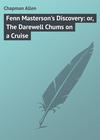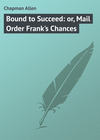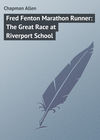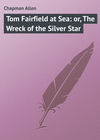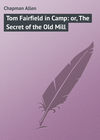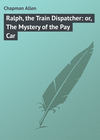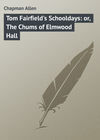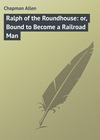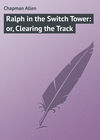Kitabı oku: «Fenn Masterson's Discovery: or, The Darewell Chums on a Cruise», sayfa 8
CHAPTER XXI
THE CHINESE BUTTON
Game was not so plentiful in the woods about the camp, as the three chums had hoped. Frank, Ned and Bart tramped along, keeping a close watch for anything that would promise to restock the larder, but, for some time, the most they saw, were numbers of small birds – too small to shoot.
“Why can’t we scare up a covey of partridges?” asked Ned, rather disgustedly, after they had been out an hour or more.
“Why don’t you wish for a herd of deer, or a drove of bears, that is if bears go in droves,” suggested Bart. “You want things too easy, you do.”
“I don’t care whether they’re easy or not, as long as there are some of them,” retorted Ned. “I’d like to hear how this gun sounds when it’s shot off.”
“Hark! What’s that?” exclaimed Bart, looking up as a sudden whirring noise was audible in the air over their heads.
The boys looked up, and, to their surprise, saw a big flock of wild ducks, flying quite low. It was rather early in the season for them, as they learned later, but they did not stop to think of that. Without further words, they raised their guns and blazed away.
“Hurrah! We got some!” yelled Ned, as he saw several of the wild fowl tumbling earthward.
“The other barrel!” exclaimed Frank. “We may not get another chance, and we’d better kill enough to last us a week.”
They fired again, and killed several more of the ducks. They found the birds to be in fairly good condition, though they would be fatter later on.
“They will make fine eating!” remarked Bart, as he held up a string of the wild fowl. “Maybe Fenn won’t like to set his teeth in a nice browned piece of roast duck.”
“Providing he is well enough to eat it,” added Ned.
“Oh, he’ll be well enough,” was Frank’s answer. “But I’d like to get something else besides duck.”
“Well, we’ve got plenty of time yet,” suggested Bart. “Let’s go a little farther.”
Slinging their game over their shoulders, and reloading their guns, the boys once more started off. They had not gone far before a commotion in a clump of underbrush, just ahead of where Ned was walking, startled the lad into sudden activity.
“Here’s something!” he called in a hoarse whisper.
“Yes, and it’s liable to come out and shake hands with you, and ask how you like the weather, if you yell that way again,” remarked Frank. “Don’t you know any better than to call out like that when you’re hunting?”
“I couldn’t help it,” whispered Ned. “I saw something big and black. I think it’s a bear.”
“A bear! Where?” cried Bart in a whisper, cocking his gun.
“Go easy,” advised Frank. “We stand a swell chance of killing a bear with these light shotguns. Where is it, Ned?”
The boys were all speaking in low tones, and had come to a halt in a little circle of trees. All about them was thick underbrush, from the midst of which had issued the disturbance that caused Ned to exclaim.
“There it is!” he said, grasping Frank by the arm, and pointing toward something dark. At that moment it moved, and a good-sized animal darted forward, right across the trail, in front of the boys, and, an instant later was scrambling up a tall tree as if for dear life.
“Fire!” cried Ned, suiting the action to the word. He aimed point-blank at the creature, but, when the smoke cleared away, there was no dead body to testify to his prowess as a hunter.
“Missed!” exclaimed Ned disgustedly. “And it was a fine chance to bowl over a bear cub, too.”
“Bear cub?” repeated Frank. “Take a look at what you think is a bear cub.”
Frank pointed to the tree, up which the animal had climbed. There, away out on the end of a rather thin limb, it crouched, looking down on the boys – a huddled bunch of fur.
“A raccoon!” exclaimed Bart. “You’re a fine naturalist, you are, Ned. Why didn’t you take it for a giraffe or an elephant?”
“That’s all right, you’d have made the same mistake if you had seen it first,” retorted Ned. “I’m going to have a shot at it, anyway.”
He raised his gun, but the raccoon, probably thinking now was the opportunity to show that he believed in the old maxim, to the effect that discretion is the better part of valor, made a sudden movement and vanished.
“See!” exclaimed Ned triumphantly. “He knew I was some relation to Davy Crockett. He didn’t exactly want to come down, but he had some business to attend to in another tree.”
“That’s an easy way of getting out of it,” remarked Bart, “but I’ll wager you would have missed worse than I did if you had shot.”
“Oh, come on and stop scrapping!” exclaimed Frank.
“We’re not scrapping,” retorted Ned. “Only I say I’m as good a shot as he is.”
“You can prove it, by shooting at a mark, when we get back to camp,” suggested Frank. “Just now we’re out hunting, not trying to decide a rifle match.”
But word seemed to have gone through the woods that three mighty boy hunters were abroad, and all the game appeared to have gone into hiding. Tramp as the chums did, for several miles, they got no further sight of anything worth shooting at.
“I guess we’ll have to be content with the ducks, and go back,” remarked Frank, after a somewhat long jaunt in silence. “Fenn may be lonesome waiting for us.”
“I know my stomach is lonesome for something to eat,” returned Bart. “The sooner some of these ducks are roasting, or stewing or cooking in whatever is the quickest way, the better I’ll like it.”
“All right, let’s head for camp,” agreed Ned, and, having picked out their trail, by the help of a compass they carried, they were soon journeying toward where their tent was set up.
“I hope Fenn is all right,” remarked Frank, as they trudged onward.
“All right? Why shouldn’t he be?” inquired Bart.
“Well, I was a little worried about leaving him alone.”
“Why Fenn is able to take care of himself,” declared Ned. “Besides, what’s there to be afraid of?”
“I don’t know,” admitted Frank. “But suppose another spell of fever should suddenly develop, and he was all alone? It wouldn’t be very nice.”
“Well, he was as anxious to have us go as we were to start off,” remarked Bart.
“I know it, but still, I can’t help feeling a little anxious.”
“Oh, he’ll be all right,” declared Bart, confidently. “He’ll have a good fire ready for us, coffee made, and all we’ll have to do will be to clean these ducks and put them to roast.”
“I hope so,” replied Frank.
The boys, in the excitement of the chase, had gone farther into the woods than they had anticipated on starting out. Consequently it was later than they expected when they got to where they saw landmarks that told them they were near camp.
“It’s only about half a mile farther now,” remarked Bart.
“Give a yell,” suggested Ned. “Fenn will hear it and know we are coming.”
The three chums united their voices in a loud hallo; and, when the echoes had died away, they listened for an answering cry. None came, and the woods were silent, save for the noises made by birds flitting here and there in the branches of the trees.
“He didn’t hear us,” said Ned. “Try again.”
“Maybe – maybe he isn’t there,” suggested Frank, in a low voice.
“Of course he is!” declared Ned. “Maybe he’s asleep.”
“I guess he didn’t hear us,” suggested Bart. “The wind is blowing the wrong way. Let’s yell again.”
Once more they shouted, but with no effect. There came no answering hail.
“Come on!” called Frank, increasing his speed. The boys spoke but seldom during the remainder of the tramp to camp. When they came in sight of the tent they strained their eyes for a sight of their chum. He was nowhere to be seen.
“Probably he’s inside, lying down,” spoke Ned.
It needed but a glance within the canvas shelter, to show that Fenn was not there. In the gathering dusk Frank gave a hasty glance about the locality. The embers of what had been the campfire, were cold. There was no sign that Fenn had been there recently, or that he had made any preparations to receive his chums.
“He must have gone off in the woods and forgotten to come back,” suggested Bart. “Maybe he went hunting on his own account.”
“If he had, he’d have taken his gun,” replied Frank, pointing to where the weapon stood in a corner of the tent.
“Then he’s out for a walk,” declared Bart.
“He’s staying rather late,” commented Frank. “I hope – ”
Frank did not finish his sentence. Suddenly, he darted forward and picked up something off the ground.
“What is it?” asked Bart.
For answer Frank held it out on the palm of his hand. It was a small object and the two boys had to bend close to see what it was. They saw one of the peculiar brass buttons that serve to hold the loops with which a Chinese blouse is fastened.
“A Chinese button!” exclaimed Bart, in a whisper.
“The Chinamen have been here!” added Ned.
“It looks as if the smugglers had Fenn,” said Frank solemnly. “They must have sneaked in here and carried him off!”
CHAPTER XXII
FENN’S MISHAP
Fenn had not gone very far, in pursuit of the two Chinamen and their white companion, before he became aware that he was not as strong as he thought he was. In his legs there was strange trembling, and his head felt dizzy.
“I guess I was sicker than I imagined,” he said to himself, as he kept doggedly on. “But I’ll trail ’em. I’m going to find out where they are staying, how they get to the cliff, and what it’s all about.”
Ahead of him Fenn could hear the trio making their way through the underbrush. They seemed to be following some trail, as there was a faintly-defined path through the woods at this point.
“They must be preparing to smuggle in a shipload of Chinese,” thought Fenn. “Probably it’s the same gang we scared off farther down the lake. They’ve come up here. Oh, if I had some way of sending word to a government detective, I could catch ’em in the very act! But, if I can find out where the landing place is I can show the officers how to get to it. That is, if they don’t take the alarm and skip out. They must know me by this time.”
The trail was becoming more difficult to follow. It still led toward the lake and Fenn was sure he was on the right track. Already he had visions of what he would do with the reward money, after he had given his chums their shares.
“Whew! But I’m getting tired!” exclaimed the lad, after making his way through a particularly thick bit of underbrush. “I wish some of the fellows were along to take up the chase. I wonder if they’re going much farther?”
He paused a moment to rest, and listened intently for a sound of the retreating footsteps of those ahead of him.
“Why,” he exclaimed, after a second or two. “I can’t hear them!”
There were no sounds save those made by the birds and small beasts of the forest.
“They’ve distanced me!” Fern exclaimed. “I couldn’t keep up with them! Now I’ve lost track of them! What shall I do?”
He was trembling, partly from excitement, and partly from nervousness and weakness. A mist seemed to come before his eyes. He looked about him and saw, off to the left, a little hill.
“I’ll climb that, and see if I can catch a glimpse of them,” he said, speaking aloud. The sound of his own voice seemed to bring his confidence back to him. His legs lost their trembling and he felt stronger.
Up to the summit of the hill he made his way, finding it a more toilsome climb than he had imagined. He reached the top. Below him, stretched out like a narrow ribbon of gray on a background of green, was the little trail he had been following, and which had been taken by the three men. It wound in and out among the woods, extending toward the lake, a glimpse of the shining water of which Fenn could just catch.
Something moving on the trail caught his eye. He looked intently at it, and, the next moment he exclaimed:
“There they are! They’re hurrying along as if a whole band of detectives was after them, instead of me alone. Now to see if I can’t catch up to them.”
He gave one more look at the two Celestials and the white man, who, every moment were nearing their goal, and then, hurried down the other side of the hill, to cut across through the woods at the foot, and so reach the trail.
Fenn had not gone more than a dozen steps when suddenly, having made a jump over a large boulder in his path, he came down rather heavily on the other side, in the midst of a clump of ferns.
There was a curious sinking of the ground, as though it had caved in. Fenn felt himself falling, down, down, down! He threw out his hands, and tried to grab something. He grasped a bunch of fern, but this went down with him.
“Help! Help!” he instinctively called, though he knew no one was within hearing, save, perhaps, those three strange men, and he did not believe they would help him if they did hear his calls for aid.
Fenn was slipping and sliding down some inclined chute that seemed to lead from the summit of the hill, into the interior of the earth. It was so dark he could see absolutely nothing and all he could feel around him were walls of dirt.
They seemed strangely smooth, and he wondered how he could slide over them and not feel bumps from rough stones which must surely be jutting out here and there from the sides of the shaft down which he had tumbled.
He put out his hands, endeavoring to find something to grasp to stay his progress, and then he discovered the reason for his smooth passage.
The walls of the curious slanting tunnel, in which he had been made an involuntary prisoner, were composed of smooth clay. Down them water was slowly dripping, from some subterranean spring, making the sides as smooth and slippery as glass.
Fenn tried in vain to dig his fingers into the walls, in order to stay his progress, but he only ran the risk of tearing his nails off, and he soon desisted. All he could do was to allow himself to be carried along by the force of gravity, and the incline of the tunnel was not so great as to make his progress dangerous.
“It’s the stopping part I’ve got to worry about,” thought poor Fenn. “I wonder what’s at the end of all this?”
Suddenly, as he was sliding along, feet foremost, in the darkness, his outstretched right hand came in contact with something that caused him to start in terror. It was a round, thin slimy object, that seemed stretched out beside him.
“A snake!” he exclaimed. “I’ve fallen into a den of serpents!”
He drew his hand quickly away, fear and disgust overpowering him for a moment. Then the thing seemed to be at his left hand. This time, in spite of himself, his fingers closed around it.
“A rope! It’s a rope!” he cried aloud, as he vainly tried to catch hold of it and stay his sliding downward. But the rope slipped from his fingers, and his journey down the curious shaft was unstayed.
“This must have been dug by men,” thought Fenn. “I’ll wager the smugglers had something to do with it. Why, maybe it’s one of the ways they land their men. That’s it! I must be sliding right down into the lake. They use the rope with which to pull themselves up the slippery tunnel.”
This idea seemed feasible to him, and he made further efforts to grasp the rope, in order that he might stop and pull himself up, instead of being carried on into Lake Superior.
For that this was to be his fate he now feared, since, as near as he could tell, the tunnel sloped in that direction. But though he occasionally felt the rope, first on one side of him, and then on the other, he could not get a sufficient grasp on the slippery strands, covered as they were with clay, to check his progress.
“I guess I’m doomed to go to the bottom,” he thought. “If I only fall into deep water it won’t be so bad. I can swim out. But if I land on the rocks – ”
Fenn did not like to think about it. In fact his heart was full of terror at his strange situation, and only his natural courage kept him from giving way to despair. But he was filled with a dogged determination to save himself if he could, even at the end.
Though it has taken quite a while to describe Fenn’s queer mishap, it did not take him long to accomplish it. He was slipping along at considerable speed, being shunted from side to side as the tunnel widened or narrowed, but, on the whole, being carried onward and downward in a fairly straight line.
Suddenly the blackness was illuminated the least bit by a tiny point of light below and in front of him. It looked like an opening.
“There’s daylight ahead,” thought the boy. “That must be where the fresh air comes from,” for he had noticed that the tunnel was not close, but that a current of air was circulating through it. Fenn was wrong as to the source of this supply, as he learned later, but he had little time to speculate on this matter, for, much sooner than he expected, he had reached the spot of the light.
He saw, suddenly looming before him, an opening that marked the end of the tunnel. The shaft gave a sharp upward turn and Fenn was shot up and out, just as are packages that are sent down those iron chutes from the sidewalk into store basements.
A moment later the boy, covered with mud from head to foot, found himself on a narrow ledge on the face of a cliff overlooking Lake Superior. He lay, partly stunned for a moment, and blinking at the strong light into which he had come from the darkness of the shaft.
Below him rolled the great lake, on which he and his chums had so recently been sailing in the Modoc. Fenn arose to his feet, and gave a glance about him.
“It’s the same place!” he murmured. “The same place where we saw the men who so mysteriously disappeared! I’m on the track of their secret!”
He looked at the ledge on which he stood. It was long and narrow, and, not far from where he was, he saw a partly-round opening, that seemed to be the mouth of another shaft, leading straight down.
“Well, more wonders!” exclaimed Fenn, walking toward it. As he did so, he was startled to see the head of a man emerge from the second shaft. The fellow gave one look at Fenn and then, with a cry of warning to some one below, he disappeared.
Fenn, startled and somewhat alarmed, hesitated. He was on the brink of an odd discovery.
CHAPTER XXIII
THE SEARCH
Following the finding of the Chinese button, and Frank’s conclusion that the smugglers had carried Fenn off, the three chums, back in camp, startled by the terror the thought gave them, stood looking at each other for several seconds. They did not quite know what to make of it.
“Do you really think the smugglers have him?” asked Ned, of Frank.
“Well, it certainly looks so. Fenn is gone, and this button is evidence that some Chinese have been here.”
“But might not Fenn be off in the woods somewhere, and the Chinese have paid a visit here while he was away?” asked Bart.
“Of course that’s possible. But I don’t believe Fenn, sick as he was, would remain away so long.”
“Couldn’t that brass button come from some other garment than one worn by a Chinaman?” inquired Ned.
“It could, but for the fact that it has some Chinese characters stamped on the under side, where the shank is,” and Frank showed his chums the queer marks, probably made by the Celestial manufacturer. “Then, here’s another bit of evidence,” and he pointed to the ground.
Ned and Bart looked. There, in the soft earth, they plainly saw several footprints, made by the peculiar, thick-soled sharp-pointed shoes the Chinese wear.
“They’ve been here all right,” admitted Bart in a low voice. “What’s to be done about it?”
“I think we ought to see if we can’t find Fenn,” declared Ned. “We ought to follow and see where these Chinese footsteps lead. Maybe Fenn is held a prisoner.”
“That’s what we ought to do,” agreed Frank. “However, it is too late to do anything much now. It will soon be night. I think we’d better get something to eat, sleep as much as we can, and start off the first thing in the morning. Maybe we can trail the smugglers by following the Chinese footprints, and, in that way, we may find – Fenn.”
Frank hesitated a bit over his chum’s name, and there was a catch in his voice. The other boys, too, were somewhat affected.
“Oh, we’ll find him all right,” declared Ned, confidently, to cover up the little feeling he had manifested. “If those smugglers have him, why – we’ll take him away from them, that’s all.”
“That’s the way to talk!” exclaimed Frank. “Now let’s get some grub. What did we shoot all these ducks for?”
The chums soon had a meal ready, but, it must be confessed, the ducks did not taste as good as they expected they would. However, that was more because of their anxiety over Fenn, than from any defect in the birds or their cooking.
Morning came at last, after what the three Darewell boys thought was the longest night they had ever experienced. They only slept in dozes, and, every now and again, one of them would awake and get up, to see if there were any signs of the missing Fenn.
“Poor Stumpy,” murmured Ned, on one occasion, when a crackling in the underbrush had deluded him into the belief that his chum had returned, but which disturbance was only caused by a prowling fox. “Poor Fenn! I hope he’s in no danger!”
If he could have seen Fenn at that moment he would have had good reason for expressing that hope.
“Now for the trail!” exclaimed Bart when, after a hasty breakfast, the three boys, shouldering their guns, were ready to start. “Which way, Frank? You seem to have run across the track of these smugglers, and it’s up to you to follow it. Lead on.”
“I guess we’ll have no difficulty in following the trail as far as it goes,” remarked Frank. “When a Chinaman goes walking he leave a track that can’t be duplicated by any other person or animal. Lucky it didn’t rain in the night, for what tracks there are will still be plain. And we don’t have to worry about a crowd walking over the place where they were. We’re not troubled by many neighbors in these woods.”
They started off with Frank in the lead, and he kept a careful watch for the Chinese footprints. At first they were easy to follow, as the ground was soft, and the queer cork-soled shoes had been indented deeply in the clay. But, after a time, the marks became so faint that, only here and there could they be distinguished.
Then it became necessary for Frank to station one of his chums at the place where the last step was seen, and prospect around, considerably in advance, until he picked up the next one.
“If we had a hound we wouldn’t have all this trouble,” he said.
“But, seeing as we haven’t, we’ll have to be our own dogs,” retorted Ned. “I guess we can manage it.”
They followed the footprints of the one Chinaman for a mile or more, and then they came to an end with an abruptness that was surprising, particularly as the last one was plainly to be seen in a patch of soft mud.
“Well, he evidently went up in a balloon,” announced Bart.
“It does look so, unless he had a pair of wings in his pocket,” supplemented Ned.
Frank went on ahead, looking with sharp eyes, for a recurrence of the prints. He went so far into the woods that Bart called to him.
“Do you think he jumped that distance?”
“I don’t know,” replied Frank. “I’m going to look – ”
He stopped so suddenly that his chums were alarmed and ran forward to where he was. They found him staring at some marks in the earth, and the marks were those they sought – the footprints of the Chinese.
“How in the world did he ever get over that space without touching the ground?” inquired Ned. “He must be a wonder, or else have a pair of those seven-league-boots I used to read about in a fairy book, when I was a kid.”
“Look there!” exclaimed Bart, pointing up to a tree branch overhead.
“Horse hair!” exclaimed Ned. “I didn’t know a horse could switch his tail so high.”
“Horses nothing!” retorted Bart. “That’s hair from the queue of a Chinaman, or I’ll eat my hat!”
“But what’s it doing up in the tree?” demanded Frank.
“That’s how he fooled us,” replied Bart. “He thought some one might trail him, and when he got to a good place, he took to the trees. They are thick enough here so he could swing himself along from limb to limb, and, after he covered twenty-five feet or more, he let himself down. It was a good Chinese trick, but we got on to it. His pigtail caught in a branch. I guess it hurt him some.”
“Yes, here are his footsteps again, as plain as ever,” said Frank, pointing to where the queer marks were to be seen.
“But, say, we’ve forgotten one thing,” said Ned suddenly.
“What?” asked Bart.
“We haven’t looked for Fenn’s footprints. All along we’ve been paying attention to only the marks made by the Chink. Now where does Fenn come in? This Chinese fellow couldn’t carry him; could he?”
“Not unless the Chink was one of the gigantic Chinese wrestlers I’ve read about,” admitted Bart. “That’s so, Ned. We have forgotten all about Fenn’s footprints.”
The three boys looked at each other. In their anxiety at following the trail of the queer marks they had lost sight of the fact that they wanted a clue to Fenn, as well as to the smugglers.
“I suppose we’d better go back to camp and begin all over,” suggested Ned.
“No,” decided Frank, after a moment’s thought. “Let’s try these prints a little longer. Maybe they’ll lead us to some place where we can get on Fenn’s trail.”
The others agreed to this plan, and, once more, they took up the search. They had not gone far before Frank, who was again in the lead, called out:
“Here we are, fellows! This explains it!”
Ned and Bart hurried forward. They found that Frank had emerged upon a well-defined trail, that led at right angles to the one they had been following. But, stranger than that was what the trail showed.
There, in plain view, were the footprints of two Chinese and the unmistakable mark of a white man’s foot.
“There were two parties of smugglers!” exclaimed Ned.
“Either that, or one member of the single party made a cut through the woods, came to our camp, and then joined the others right here,” said Frank.
“Still, I don’t see anything of Fenn,” remarked Bart.
“No? What’s that?” demanded Frank quickly, pointing to footprints, quite some distance back of the others.
“Fenn’s! I’ll be jiggered!” cried Bart. “I can tell them by the triangle mark, made with hobnails that he hammered into the heels of his shoes, after we decided to come on this trip. He said that would prevent him slipping around on deck.”
“Those are Fenn’s footsteps all right – unless some one else has his shoes,” declared Ned. “Come on! We’re on the right trail at last.” And the boys hurried forward, hope once more strong in their hearts.
